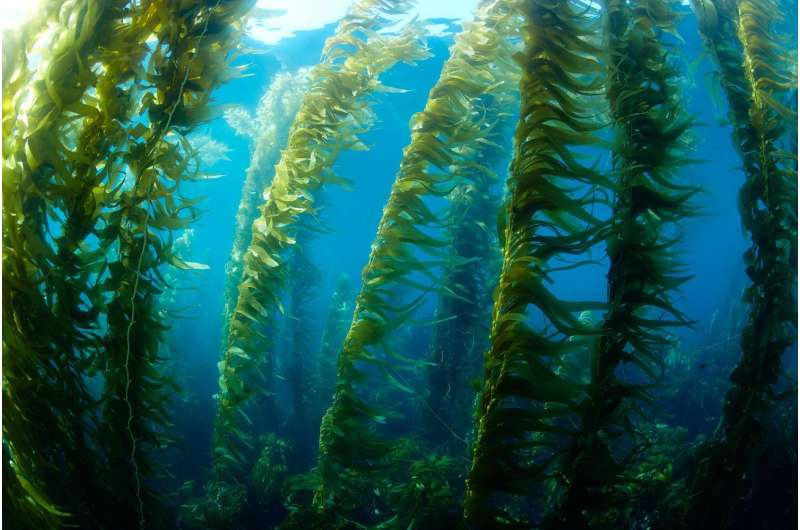September 4, 2017 weblog
Growing kelp for biofuel: Researchers aim to harness potential

(Tech Xplore)—Sources of energy frequently in the limelight are solar, wind and hydropower.
There is another source being explored, however, and it is being looked at as a biofuel of the future. The setting is the Pacific Ocean and the project to explore this source is happening off the coast of California.
That source is kelp. How about it? Kelp to bio-crude? Could it one day provide a source of energy to compete with fossil fuels?
The challenge is taken on by a company, Marine BioEnergy. They are in collaboration with a research team at the University of Southern California, Wrigley Institute for Environmental Studies, which has a research facility on Catalina Island, about 25 miles off the coast of Los Angeles. The island is known for its kelp beds and clear water.
They are now doing proof-of-concept testing.
Adele Peters in Fast Company: "If the study works as hoped, the startup behind it, Marine BioEnergy, wants to use similar technology, driven by robotic submarines, to begin farming large tracts of the open ocean between California and Hawaii."
How that larger scheme would work:
Their approach involves growing kelp attached to large grids in the ocean, with each grid towed by underwater drones.
The drones will maintain the grids near the surface during the day to gather sunlight but at night, will take the grids down to the deeper, cold water where the kelp can absorb nutrients. Every three months, the drones will move the kelp farms to scheduled locations to rendezvous with harvesters.
Why focus on kelp?
Advantages include its nature as fast-growing and potential to produce biomass year-round.
"It's one of the fastest-growing plants on Earth and farming it requires no fertilizer, fresh water, pesticides, or arable land," said a report from NPR.
Oil tankers could be filled with high-value biocrude at the harvesting sites in the ocean, the company said, making the whole process carbon-neutral.
"Kelp is transformed into biofuel by 'thermochemical liquefaction,' said NPR. The kelp is dried out, and the salt is washed away. Then it's turned into bio-oil through a high-temperature, high-pressure conversion process.
Currently the effort is sometimes referred to as the elevator project and NPR explained why. They are trying to build a machine to raise and lower kelp beds, in order to get sunlight in shallow water and nutrients in deep water.
Most of the well-lit surface of the oceans is a nutrient "desert", devoid of major macroscopic plant production because the surface waters are nutrient-poor. Deeper, colder waters are nutrient-rich, said the company site.) Success would mean they can farm miles from shore.
Basically this is "a long tube with seaweed growing on it," as Fast Company put it.
The NPR site showed a picture of Kelp plants, which are set to grow on a 30-foot-long, white PVC pole suspended in the water. If successful, there would be a platform hundreds of meters across and hundreds deep, of kelp plants, the caption said.
The goal is to grow enough kelp to make the effort economically feasible.
Diane Kim, a scientist at the University of Southern California's Wrigley Institute for Environmental Studies, is helping run the proof-of-concept study of Marine BioEnergy's technology at Catalina.
Peters quoted Kim: "You're going to need a lot of kelp in order to make it cost-competitive with something like coal, fossil fuels, or natural gas," Kim said. "In order to grow that much kelp, you really have to move outside the normal range of where kelp is found, which is along the coast."
More information: www.marinebiomass.com/
© 2017 Tech Xplore

















